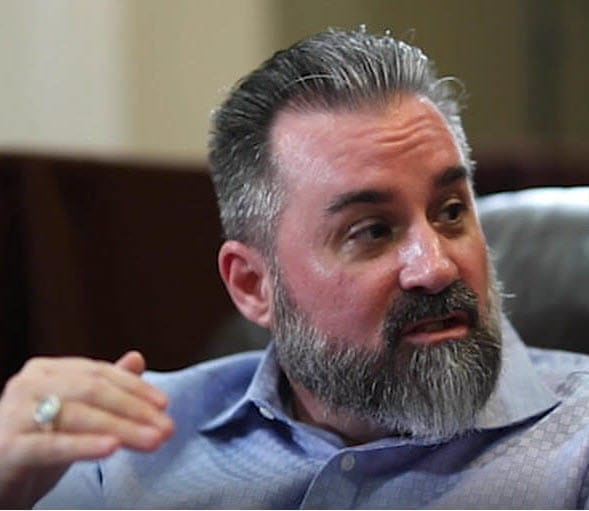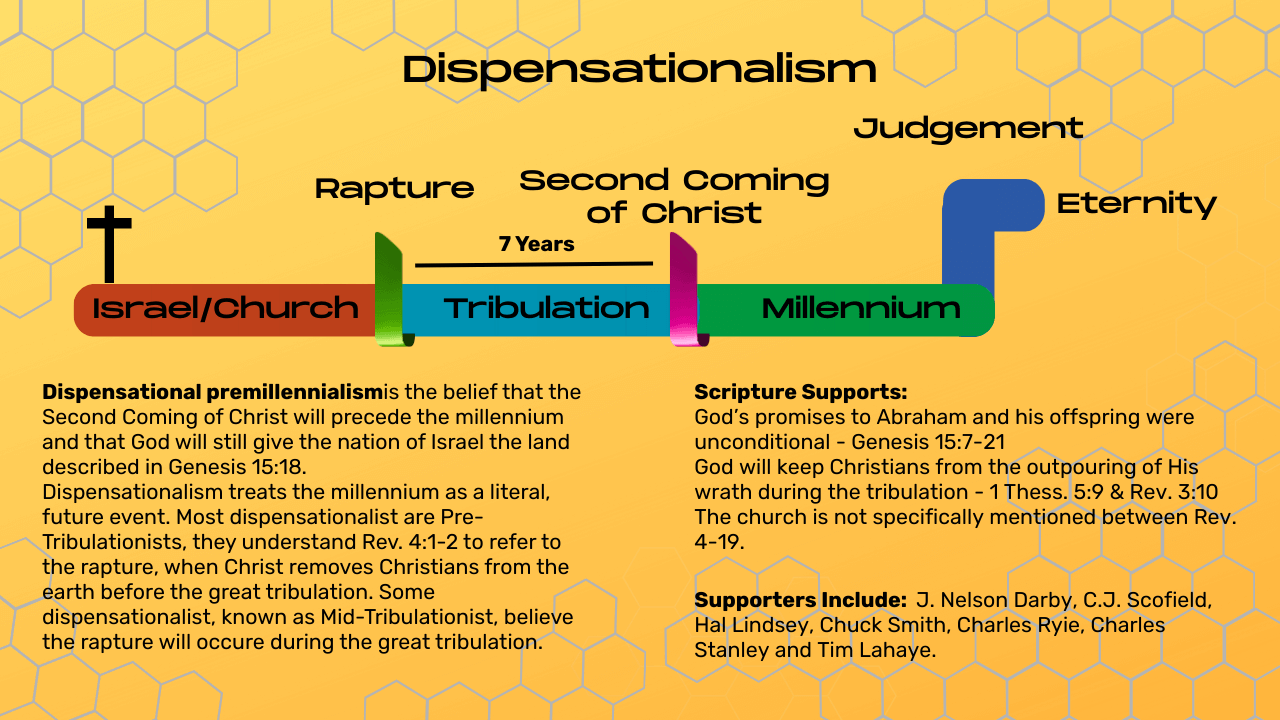
Dispensationalism
Understanding God's Plan for Israel and the Church
Here's why dispensationalism hooks people: you read God's promises to Israel in the Old Testament—land borders, temple details, tribal arrangements—and think, Did God mean that or not? Then you read the New Testament and the church shows up as something called a "mystery" that wasn't fully revealed before. Micro-promise: Dispensationalism doesn't invent divisions; it insists God keeps specific promises to specific people in specific ways while also working through the church.
I get the appeal. God tells Abraham his descendants will have the land "forever"—dispensationalists read that straight: forever means forever. Jesus promises to return for His church—dispensationalists read that straight too: that sounds like a different promise. There's a simple power to a system that refuses to spiritualize away concrete promises.
But the real question isn't whether God keeps promises—it's how He keeps them. Does He fulfill Israel's promises literally and physically, or spiritually through Christ and the church? That's where dispensationalism and covenant theology split.
Dispensationalism sketches a detailed roadmap of the future. Along the way it forces us to ask sharper questions about interpretation, the unity of Scripture, and how God's promises play out in history and in our time.
Sharp Edge: If your eschatology makes you more excited about prophetic charts than you are about the Gospel that saves people right now, you've turned Bible study into a puzzle game instead of life transformation.
What Dispensationalism Actually Teaches
Here’s the quick gist: dispensationalism organizes history, keeps Israel and the church distinct, reads prophecy literally, and expects a soon rapture that changes God's focus back to Israel.
God Has Distinct Plans for Israel and the Church
At the core is a firm separation between Israel and the church. Dispensationalists insist the promises to Abraham, Isaac, and Jacob—land, descendants, and blessing—still await literal fulfillment rather than being exhausted by the church.
The church is viewed as a kind of parenthesis in redemptive history: vital now, but not the final focus. God's attention will return to Israel during the tribulation and the millennium.
This is not replacement theology (the church replacing Israel) nor a bland fulfillment theory; it's a claim that both people have different roles in God's plan.
History Is Divided into Dispensations
Classical dispensationalism breaks redemptive history into distinct administrations: Innocence, Conscience, Government, Promise, Law, Grace (the current church age), and Kingdom (the millennium). Each dispensation reflects a different way God interacts with people and tests them—pattern: commission, failure, judgment.
The Rapture Precedes the Tribulation
Dispensationalists read 1 Thessalonians 4:16–17 as a separate "caught up" event: Christ comes for His church before the seven-year tribulation (Daniel’s 70th week). That removal makes space for God to deal specifically with Israel.
Literal Interpretation of Prophecy
When Revelation or the Prophets mention numbers, places, and concrete events, dispensationalists tend to take them at face value. So the 144,000 in Revelation is read as literal Jewish evangelists, and promises like Zechariah 14:4 (Christ's feet on the Mount of Olives) are expected to be fulfilled on that mountain, in that land.
The Dispensational Timeline (Short)
Dispensationalists summarize the future like this: we live in the church age (grace); Christ can rapture believers at any time; a seven-year tribulation follows; Christ returns to set up a literal 1,000-year kingdom on earth centered in Jerusalem; then the eternal state. That sequence ties together promises to Israel, prophetic passages in Daniel and Revelation, and a literal reading of kingdom promises.
The Church Age (Current)
Dispensationalists say we're in the dispensation of grace—God is working mainly through the church right now. Israel exists as a nation, but the church is the primary vehicle for the gospel in this age.
The church's task: carry out the Great Commission until the "fullness of the Gentiles" comes in (Romans 11:25). In short: reach people, plant churches, make disciples.
The Rapture (Imminent)
In dispensational thinking the rapture is imminent—Christ could return for His church at any time (the "blessed hope" of Titus 2:13). This event is read as distinct from the final, visible second coming: first He comes for His saints; later He comes with them.
The Tribulation (Seven Years)
After the rapture, God's attention returns to Israel. Dispensationalists identify the tribulation with Daniel’s 70th week—a seven-year period that judges the world, purifies Israel, and sets the stage for Christ's earthly kingdom.
Because the church has been removed, God can carry out covenantal judgments and promises to Israel without the church functioning as mediator in that age.
Sharp Edge: Take note. There is no evidence to suggest that we live in a church age. Revelation chapter 2-3 were literal letters to literal churches and what was said meant something to them. Hermeneutically, they were the original audience. It was Tim Lahey who said we live in a church age, and he went on to sell several books on that.
The Millennium (Literal 1,000 Years)
At Christ’s return He establishes a literal 1,000-year kingdom on earth, centered in Jerusalem. He rules from David’s throne; Israel is restored to the land, the temple is rebuilt, and the world enjoys unprecedented peace and righteousness.
The Eternal State
When the millennium ends, Satan is briefly released, defeated finally, and the great white throne judgment happens. Then comes the new heaven and new earth—the consummation of God’s promises and the final, eternal state for redeemed people.
Biblical Evidence Dispensationalists Emphasize
God's Unconditional Promises to Israel
Dispensationalists point to texts like Genesis 12:1–3 and 15:18–21 and 2 Samuel 7:12–16 as clear, unconditional promises about land, descendants, and an enduring throne for Israel. Their claim: those promises haven't been fully realized yet and therefore call for literal fulfillment.
They also appeal to Romans 11:29—"the gifts and the calling of God are irrevocable"—to argue God won't cancel His promises to Israel simply because the church exists.
The Church as a Mystery
Passages such as Ephesians 3:4–6 label the church a "mystery" not fully revealed in the Old Testament. Dispensationalists use that language to argue the church is a distinct, new administration in God's plan—not just a renamed continuation of Israel.
Literal Fulfillment of Prophecy
Because many first‑coming prophecies (birth in Bethlehem, descent from David, suffering and resurrection) were fulfilled in specific, concrete ways, dispensationalists argue we should read second‑coming and kingdom promises the same way—literal, geographic, and bodily.
The 144,000 in Revelation
Revelation 7:4–8 names 144,000 and lists tribal names—language dispensationalists read as specific and ethnic. If this text were merely symbolic of the church, they ask, why use explicit Israelite markers?
That said, some honest nuance is necessary: serious scholars offer alternative, non‑literal readings of these passages. A brief note of charity toward differing interpretations helps the discussion stay fair and focused on the texts rather than polemics.
Challenges Dispensationalism Faces
The Unity of Scripture
Critics say dispensationalism fragments God's story into disconnected periods instead of reading a single, unfolding redemption in Christ. The objection: splitting history into too many administrations risks losing the gospel's coherence.
Dispensationalist reply: Pointing out distinct administrations doesn't deny unity, they say; every dispensation still points to Christ and his work. The claim is that recognizing different ways God interacts with people actually clarifies how promises unfold across time.
The Nature of Fulfillment
Another flashpoint: are Old Testament promises fulfilled literally or spiritually? Galatians 3:16 is often cited to show the promises are fulfilled in Christ—not merely in ethnic descendants.
Dispensationalist reply: They distinguish between promises realized in Christ (spiritually) and promises that remain to be fulfilled literally (land, national restoration). In their view, both senses can coexist without contradiction.
The Timing of the Rapture
Some ask how a pre‑tribulation rapture fits with Jesus' prayer that believers be kept from the evil one (John 17:15)—does Christ remove his people or protect them within the world?
Dispensationalist reply: Protection and removal aren't mutually exclusive. If the tribulation is a period appointed mainly for Israel, removing the church can be seen as a form of divine protection.
The Purpose of the Millennium
Critics also wonder: if believers get glorified bodies at the rapture, why an earthly millennium? What's the point of a physical kingdom after transformation?
Dispensationalist reply: The millennium, they argue, demonstrates God's faithfulness to covenant promises to Israel and provides the setting where those national promises are literally realized.
Why Some Christians Embrace Dispensationalism
- It honors God's promises: proponents refuse to spiritualize away specific Old Testament promises about land, descendants, and kingdom.
- It gives prophetic detail: for readers who want a clear framework for Daniel and Revelation, dispensationalism supplies a concrete timeline and expectations.
- It offers comfort: a pre‑tribulation rapture gives believers hope that the church will be spared the worst of the coming judgment.
Why Some Christians Reject Dispensationalism
- It can feel fragmenting: opponents worry the system divides Scripture into compartments too sharply.
- It may overemphasize Israel: some fear it elevates ethnic Israel in ways that distract from Christ and the gospel’s global mission.
- It can encourage escapism: focus on exit strategies (rapture talk) sometimes sidelines present responsibilities and cultural engagement.
Sharp Edge: Be very careful with your studies. Do you're own homework! Even so called experts can get it wrong. The Bible says "No one knows the day or the hour", so why would you expect Hal Lindsey to be correct when he said the rapture will happen in 1981? He also advocated for a 7 year tribulation saying that Christ would return in 1988.
Not only was he wrong on both, but his understanding was clouded. There is no 7 year tribulation per say. It's actually two 3 1/2 year periods that are back to back. The first half is business as usual and its only the second half that gets ugly.
What to watch for: Note, I no longer hold to this view, but if you wanted to hold to a pre or post trib. view, you should watch for the seasons. (1) The peace agreement over the disputed territory (2) The rebuilding of the temple for the Jews where animal sacrifices resume again (3) the abomination of destruction where the Anti-Christ puts and end to the animal sacrifices and says ya'll can worship me now instead.
History and Weight
Finally, there’s the historical critique: classical dispensationalism rose mainly in the 19th century, so it lacks the long pedigree of earlier theological systems. That doesn't invalidate its arguments, but it matters to readers who weigh historical continuity.
In short: dispensationalism has sincere strengths—clarity, a strong textual instinct for promises, and pastoral appeal—and real weaknesses—questions about unity, emphasis, and historical roots. Faithful Christians can honestly disagree without falling into caricature.
Living as a Dispensationalist
Study prophecy responsibly.
Prophecy should drive you to holiness, not to wild speculation. Read Daniel, Revelation, and the prophetic books with humility—let interpretation serve spiritual formation, not curiosity alone.
Support Israel biblically, not politically.
It's reasonable to distinguish a theological commitment to God's promises to Israel from automatic endorsement of every modern policy. Back your convictions with Scripture and careful thought, not impulse or partisanship.
Keep a present focus.
The rapture might be soon—or it might not. Either way, live faithfully now: make disciples, serve neighbors, and care for the poor. Eschatology should sharpen mission, not dull it.
Practice humility.
Serious Christians disagree about timing and details. Hold your views with conviction but without contempt for those who read the Bible differently.
We don't sidestep hard topics. We face them with Scripture, honesty, and respect. Start by exploring our category pages—they're practical and built to help you think biblically. If what you find is useful, take your time and drill down into the articles within each category. If you do, you'll learn a lot—and you'll be better equipped to live like Christ.
Amillennialism: A Biblical Perspective on the Millennium - Understand the amillennial view that the millennium represents Christ's current spiritual reign through the church.
Premillennialism: A Literal View of the Millennium - Explore the premillennial view that Christ will return to establish a literal thousand-year reign on earth.
Postmillennialism: A Hopeful View of the End Times - Discover the postmillennial perspective that emphasizes the church's role in advancing God's kingdom before Christ's return.
Put this into practice
Study Daniel 9:24–27 to see how dispensationalists read the seventy weeks and the gap before the 70th week.
Read Romans 9–11 to wrestle with Paul's teaching about Israel's role and the interplay of promises and the church.
Compare 1 Thessalonians 4:13–18 with other return texts to form a balanced view of the rapture debate.
Research historical fulfillments of Old Testament promises to judge what remains unfulfilled.
Practice alternating literal and symbolic readings of Revelation to understand how interpretive approach changes conclusions.
Sharp Edge: I have a lot of respect for Hal Lindsey as he used to have a show on TV called Late Great Planet Earth and it was enlightening. However, we should not outsource our homework. It's our responsibility to get this right. There are a lot of folks who was crossed the line and gone too far with this.
The list of those who were once consider respectable leaders who predicted the second coming and got it wrong continues to grow. He's just a short list: John Wesley, founder of the Methodist's (1836), Joseph Smith, founder of the LDS (1891), Jehovah's Witnesses (1914), Seventh-Day Adventist (1964), Hal Lindsey (1988), Harold Camping (1994 & 2011), Jerry Falwell (1999-2009), Jack Van Impe (2012) and the list goes on. This was the short list!!
Conclusion
Dispensationalism is a systematic approach that takes God's promises seriously, emphasizing literal interpretation and a future, earthly kingdom. Its clarity about prophecy and its insistence that God keeps specific promises to specific people attract many believers.
At the same time, it raises real questions: Are Old Testament promises fulfilled literally or spiritually? Are Israel and the church distinct administrations or one unfolding people of God? Those questions shape how you view your identity, your relationship to Israel, and your expectations for the future.
Don’t get lost in timetables. The main point matters: Jesus is Lord, He's coming back, and we are called to live faithfully for that King today. Study the prophecies, weigh the arguments, but let faithfulness—not escapism—mark your life.

Chris Daniel, just a servant of Christ calling others to be ready. Like the Bereans, I try to examine Scripture daily to see if what I hear is true. If you're struggling to live as we're called, you're still in the fight. Don't give up.
Category 2 - Christian Apologetics

Category 3 - Bible Study

Category 4 - Theology


"Most middle-class Americans tend to worship their work, work at their play, and play at their worship. As a result, their meanings and values are distorted. Their relationships disintegrate faster than they can keep them in repair. Their lifestyles resembles a cast of characters in search of a plot." - Gordon Dahl
"The Bible is a reliable collection of historical documents written down by eyewitnesses during the lifetime of other eyewitnesses that report supernatural events that took place in fulfillment of specific prophecies and claimed their writings were divine rather than human in origin."
- Dr. Voddie Baucham on 2 Peter 1






